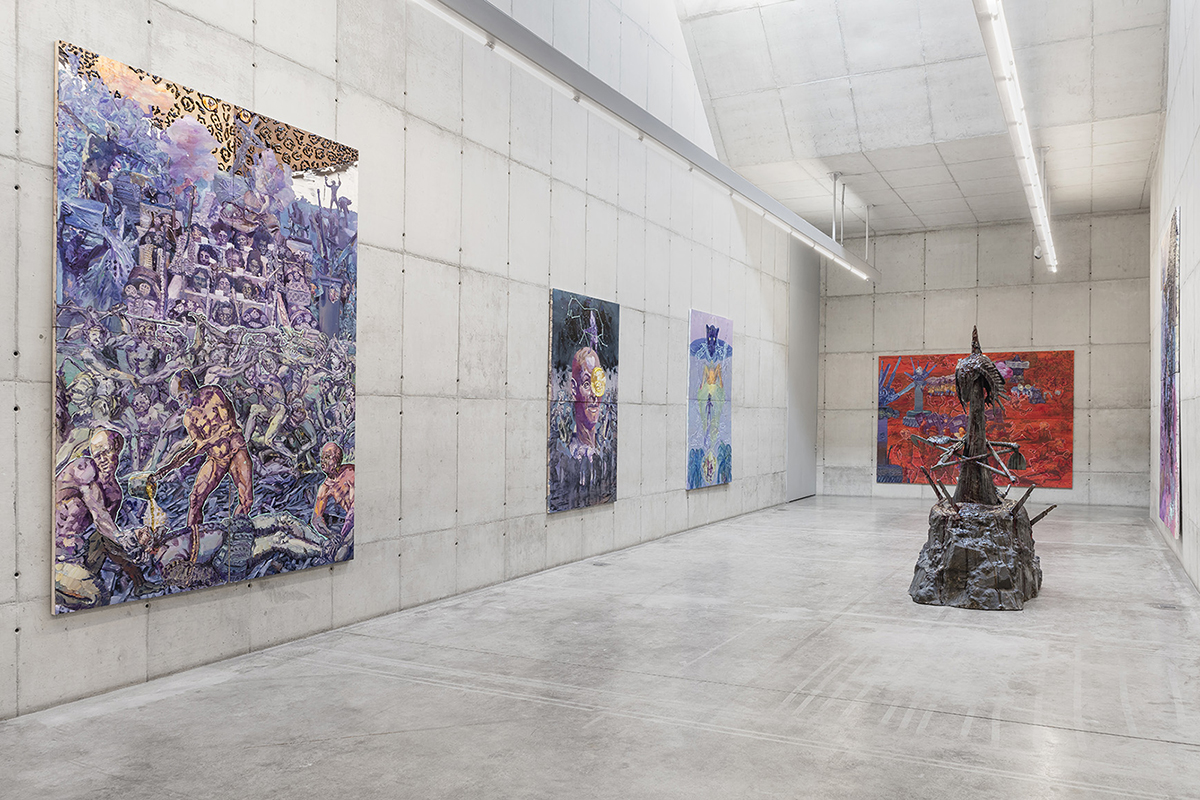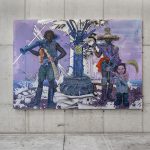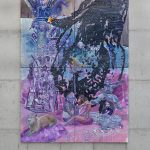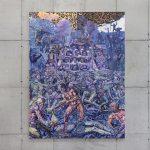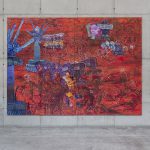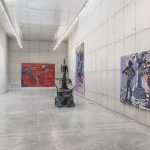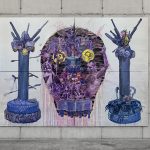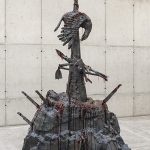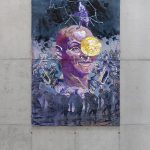To start its 2019 program, Galeria Leme A/D is pleased to announce “Necrobrasiliana”, the first solo exhibition of Thiago Martins de Melo in its space. As the gallery’s most recent member, the artist presents a new series of works, whose theme approaches concepts related to death, in order to deal with Brazil’s historical legacies through the idea of Necropolitics[1].
As from the anachronistic crossing of narratives about resistances and decadences, symbologies and characters, spirituality and syncretism, Thiago Martins de Melo uses the traditional methods of painting to address issues related to the State of Exception in Brazil. In the work “Necrobrasiliana” (2019), the artist combines large canvases to depict situations that haunt himself. On a metallic background and sided by two pillars with mutilated indigenous heads on the top, besides the imposing figure of Carlos Marighella[2], there are layers of images about moments linked to extermination and other troubles faced by minorities.
In “Caminho da Anta” [Path of Tapir] (2019), for instance, the artist revisits the homonymous constellation (as the Milky Way is called by the indigenous tradition, including the Tupinambas of the Maranhao State, where the artist is from) in a large installation composed of several small works. Each one of them brings an archetypal image, which is normally rooted in the collective consciousness of the Brazilian people, such as some iconic photographs or emblematic figures.
The works of Thiago Martins de Melo, be they sculptures, installations, videos or paintings, make impact, not only for their usual large dimensions and subjects, but essentially for their exuberance on techniques and material. In his paintings, layers and layers of processes are superimposed and combined with other types of materials attached, which extrapolate the two-dimensionality of the canvas. Large quantities of strong colour paints drive the allegorical narratives to deal with matters that are intrinsic to the conditions imposed by the colonialism in Brazil.
About the artist:
Thiago Martins de Melo. Sao Luís, Brazil, 1981. Lives and works in Sao Luís, Brazil.
Among his solo exhibitions are: bárbara balaclava, Programa Emergência, Saco Azul/Maus Hábitos, Porto, Portugal (2018); Bárbaro Barroco, Gamma Galeria, Guadalajara, Mexico (2016); Teatro Nagô-cartesiano e o Corte Azimutal do Mundo, Mendes Wood DM, Sao Paulo, Brazil (2013); III Mostra do Programa de Exposição Centro Cultural São Paulo, Sao Paulo, Brazil (2010); Sad Goat, Projeto Trajetórias 2009, Fundação Joaquim Nabuco, Recife, Brazil (2009), among others.
Group exhibitions: Verzuimd Brazil – Brasil Desamparado, Prêmio CNI SESI SENAI Mancantonio Vilaça para as Artes Plásticas, Brazil (2018); Panoramas do Sul, 20º Festival de Arte Contemporânea Sesc_Videobrasil, São Paulo, Brazil (2017); Contemporary Brazilian Arts from the Rubell Family Collection, Miami, USA (2016); Dakar Biennale, Dakar, Senegal (2016); 10a Mercosul Biennale, Santander Cultural, Porto Alegre, Brazil (2015); 1a Asunción International Biennale – Grito de Libertad, Asunción, Paraguay (2015); 31a Sao Paulo Biennale – Como (…) coisas que não existem, Sao Paulo, Brazil (2014); Histórias Mestiças, Instituto Tomie Ohtake, Sao Paulo, Brazil (2014); 12a Lyon Biennale, France (2013); To be with art is all we ask, Astrup Fearnley Museet, Oslo, Norway (2012); Caos e efeito, Itaú Cultural, Sao Paulo, Brazil (2011); among others.
His works belong to the following collections: Rubell Family Collection – Contemporary Arts Foundation, Miami, USA; MASP – Museu de Arte de São Paulo, Sao Paulo, Brazil; Thyssen-Bornemisza Art Contemporary, Vienna, Austria; Museu de Arte Contemporânea do Ceará, Fortaleza, Brazil; Astrup Fearnley Museum of Modern Art, Oslo, Norway; Gilberto Chateaubriand Collection; PAMM – Pérez Art Museum Miami, Miami, USA.
[1] The concept of Necropolitics was created by the sociologist from Cameroon Achille Mbembe to discuss how the power and sovereignty impose rules about who can live and who should die.
[2] Carlos Marighella was a Brazilian politician and activist, also writer, killed by the Military dictatorship in 1969.
Click here for the exhibition preview.
